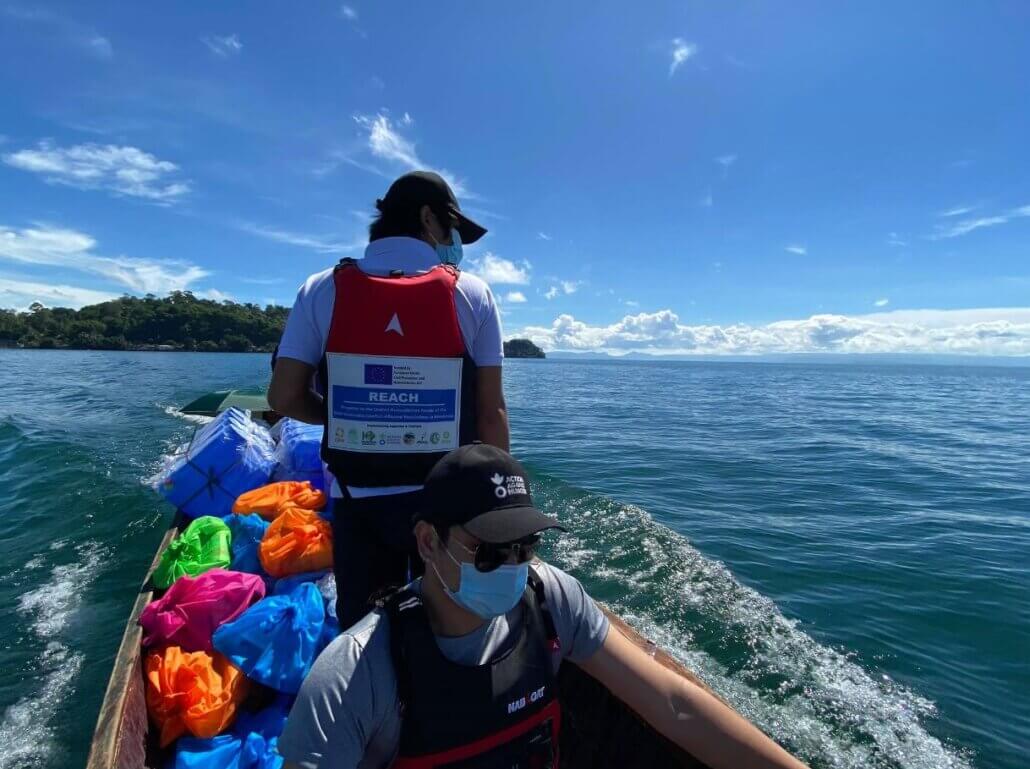CORONAVIRUS: HOW ACTION AGAINST HUNGER IS RESPONDING TO THE PANDEMIC.
At Action Against Hunger, we take the threat of coronavirus (COVID-19) very seriously and have put measures in place to protect the health and safety of our staff and people in the communities that we serve.
Since the lockdown implementations in March, most of our staff in our Manila Office have been working from home, and safety measures are strictly imposed for those who regularly report to the office. Same with our field offices in Cotabato, Iligan, Tandag, and Kidapawan, they follow a skeletal system and our teams are only permitted to travel for essential purposes. Despite these constraints, we have been able to maintain our operations as close to normal as possible.
IMPACT ON ACTION AGAINST HUNGER’S PROJECTS
Our teams in the field are taking all the necessary precautions to prevent the spread of COVID-19 to the communities we serve while ensuring the continuity of our lifesaving programs. Many of these measures are designed to protect health workers in communities and facilities, who are among the most at-risk for contracting infectious disease. These preparedness measures include restricting travel, reinforcing hygiene practices, defining isolation procedures in case of contamination, ensuring masks for staff, securing equipment to protect our healthcare facilities, and more.
In the communities in which we work, we offer our support to the health ministries through specific activities to support local systems. We will make every effort to help identify and refer infected individuals to health centers, as well as to strengthen implementation of hygiene measures to promote behavioural change, including through community support groups.
We also know that undernutrition is a risk factor for complications and death in people with coronavirus. And, as is the case with other diseases such as dengue and measles, we fear that undernutrition may make people more vulnerable to coronavirus since we know that undernutrition weakens people’s immune systems
In addition to the strain that this pandemic could put on health systems and facilities around the world, Action Against Hunger is concerned about the long-term impact this pandemic could have on poverty and hunger. As the virus continues to spread, it could impact food production and lead to food insecurity. In addition, at a macro level, when the global economy suffers, the effects on the world’s poorest populations could be devastating, driving more people into hunger and poverty.
CLEAN WATER AND HEALTHY HYGIENE AS IMPORTANT NOW AS EVER
Here are just some of the ways we promote access to safe water and healthy hygiene:
We are improving access to clean water by building and repairing water sources. By hosting community education sessions and working with mother-to-mother groups, we teach handwashing, sanitary food practices, safe infant care practices, and more. In Metro Manila and Mindanao, for example, Action Against Hunger has helped to eliminate diseases in part by distributing hygiene kits to households, installing handwashing facilities in public places and educating high-risk communities about handwashing, clean water, and improved sanitation. Our Water, Sanitation & Hygiene (WASH) programs have helped 349,686 people to date.

In addition to spreading messages about good hygiene habits, how to prevent disease, and how to keep families healthy, our research team study different ways to encourage hand-washing and healthy habits. They test innovative approaches and explore questions like: in the midst of conflict or natural disaster and in communities where access to clean water is limited, what motivates people to wash their hands?
With so much attention on coronavirus, it’s critical for all of us to remember that one in three Filipino children under the age of 5 years old suffer from malnutrition—the extreme form of hunger. We must address this pandemic, but that cannot mean that millions of children are left at risk of death from other preventable causes. To help address this, we’ve provided food packs, multi-purpose cash distributions, livelihood support & cash-for-work to 49,971 beneficiaries of our food security & livelihood (FSL) activities. For our health sector assistance, we’ve reached 155,121 with our psychosocial support, provision of PPEs to frontliners, training of health staff and volunteers, risk communication and community engagement, and advocacy and support to local government units in developing & implementing policies on COVID-19 measures.
Although coronavirus is a concern everywhere we work, Action Against Hunger remains steadfast and focused on helping the millions of vulnerable Filipinos and their families.




